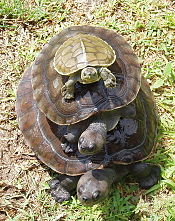
The giant Asian pond turtle inhabits rivers, streams, marshes, and rice paddies from estuarine lowlands to moderate altitudes throughout Cambodia and Vietnam and in parts of Laos, Malaysia, Myanmar and Thailand.
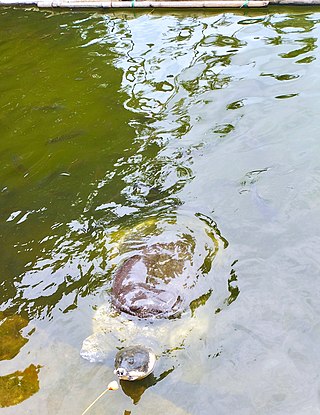
The black softshell turtle or Bostami turtle, previously placed in genus Aspideretes, is a species of freshwater turtle found in India and Bangladesh. It was long believed to be inbred individuals of the Indian softshell turtle or the Indian peacock softshell turtle, but while it is a close relative of the latter, it is a distinct species. In the 1800s it was believed these turtles were brought from Iran to Chittagong shrine pond by Hazrat Bayezid Bostami. His turtles he had brought to this pond were treated as sacred and respected by the public. Previously declared extinct by the International Union for Conservation of Nature in 2002, these turtles were found still to exist in a temple's pond called the Hayagriva Madhava Temple located in Assam, and in Kalyan Sagar lake in Tripura Sundari Temple in Udaipur, Tripura, India. Through conservation methods and protection of the species, some of these turtles can be found today throughout the wild, and scientists and environmental biologists are continuing to work hard to preserve this endangered species and their natural habitat. Their mitogenome represents relatedness to 19 other species of the Testudines. When looking at the phylogenetic tree, Nilssonia Nigricans are a species represented as sisters to Nilssonia formosa.

The Indian black turtle or Indian pond terrapin is a species of medium-sized freshwater turtle found in South Asia.

Oldham's leaf turtle is a species of turtle in the family Geoemydidae.
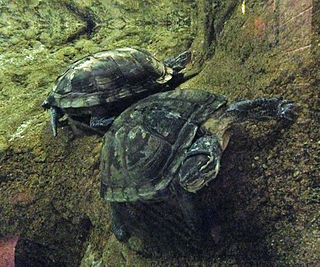
The Vietnamese pond turtle or Annam leaf turtle is a species of turtle in the family Geoemydidae.

The New Guinea snake-necked turtle is a species of turtle in the family Chelidae. The species is found almost exclusively within Western Province, Papua New Guinea.
Pritchard's snake-necked turtle is a species of turtles in the family Chelidae. The species is endemic to a restricted area of Central Province, Papua New Guinea.

Mauremys reevesii, commonly known as the Chinese pond turtle, the Chinese three-keeled pond turtle, or Reeves' turtle, is a species of turtle in the family Geoemydidae, a family which was formerly called Bataguridae. The species is native to East Asia.
The Fujian pond turtle is a possibly also naturally occurring intergeneric hybrid turtle in the family Geoemydidae produced in larger numbers by Chinese turtle farms as a "copy" of the golden coin turtle Cuora trifasciata. It appears to occur in China and Vietnam. Before its actual origin became known, it was listed as data deficient in the IUCN Red List.
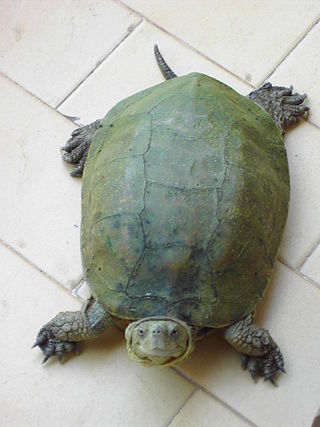
Mauremys is a genus of turtles in the family Geoemydidae.

The Japanese pond turtle, also called commonly the Japanese pond terrapin and the Japanese pond tortoise, is a species of turtle in the family Geoemydidae endemic to Japan. Its Japanese name is nihon ishigame, Japanese stone turtle. Its population has decreased somewhat due to habitat loss, but it is not yet considered a threatened species.
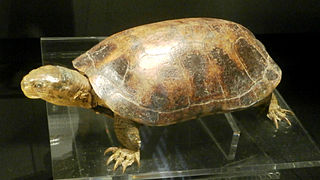
The yellow pond turtle, is a medium-sized, semiaquatic turtle in the family Geoemydidae. This species has a characteristic broad yellow stripe extending behind the eye and down the neck; the carapace ranges in color from grayish brown to brown, and the plastron is yellow or orange with black blotches along the outer edges. It is native to East Asia, ranging from central Vietnam and Laos, north through the coastal provinces of south and central China, with insular populations known from Taiwan, Hainan and the Ryukyu Islands. Although populations in the southern Ryukyus are thought to be native, populations in the northern and central Ryukyus, as well as central Japan, are believed to have been introduced as a result of imports from Taiwan.

The Chinese stripe-necked turtle or golden thread turtle, is a species of turtle in the family Geoemydidae. They are widely distributed in the subtropical regions of Taiwan.

The red side-necked turtle, red turtle, red-footed sideneck turtle, William's toadhead turtle, or red-footed Amazon side-necked turtle is a monotypic species of turtle in the family Chelidae. It is found in Colombia and possibly Peru and Brazil. This species is dimorphic in size meaning the sexes show different characteristics. One study found that the largest female out of a group of 24 was 256 mm in carapace length. Out of that same group, the largest male was only 199 mm in carapace length. A study focused on determining how these turtles acquire their sex discovered that it is not environmentally determined rather, it is a genetic sex determination.

Siebenrockiella crassicollis is a freshwater turtle endemic to Southeast Asia. It is one of two species classified under the genus Siebenrockiella in the family Geoemydidae.

Cyclemys is a genus of freshwater turtles, commonly referred to as Asian leaf turtles, from the family Geoemydidae. The genus occurs throughout Southeast and South Asia, and currently contains seven species.

The peninsula cooter is a species of freshwater turtle in the genus Pseudemys. It is sometimes considered a subspecies of the coastal plain cooter when that turtle is not itself considered a subspecies of the river cooter.

The Iberian pond turtle, also known as the Mediterranean pond turtle or Mediterranean turtle, is a species of turtle in the family Geoemydidae. The species is endemic to southwestern Europe and northwestern Africa.

The Balkan terrapin or western Caspian terrapin is a species of terrapin in the family Geoemydidae. It is found in the eastern Mediterranean region. While technically omnivorous, the terrapins are known to prefer meat. They can grow to 25 cm in carapace length, although hatchlings are usually only 3 to 4 cm in length.
The Hunan softshell turtle is a species of turtle in the family Trionychidae, the softshells. It is endemic to China, where it occurs in Hunan, Guangdong, Guangxi, and Jiangxi provinces. It is found in Taoyuan, Pingjiang, Rucheng, Lingling, and Shaoyang counties of Hunan province.



















